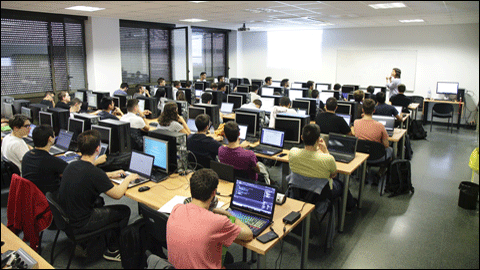The ECIU University, one of the European University proposals chosen by the EU

The challenges will be based on the United Nations' Sustainable Development Goals for cities and communities. This means learners of the ECIU University will be dealing with the real problems concerning society and helping to create a better future.
Prestigious EU Support
Following up on an initiative by French President Emmanuel Macron, the European Commission announced a call for European Universities as part of the EU's Erasmus+ programme. The project will allot 85 million euros (maximum five million euros per project for three years) to the alliances of universities with the aim of strengthening their collaborations. These alliances have had to work in depth on a European curriculum which takes into account teaching innovations, structured mobility and a European campus. Today, 26 June, the European Commission has announced that the ECIU University forms part of the 17 successful applicants.
Rector of the UAB Margarita Arboix stated that the university "is very satisfied to participate in the initiative which connects so well with our innovative, entrepreneurial and collaborative DNA".
Universities for the Future
By developing this new educational model, the ECIU University responds to the urgent societal challenges the world is facing. “These challenges we can only solve together with our most entrepreneurial students, our best researchers and experts from society,” says ECIU President Victor van der Chijs (University of Twente). “This EU grant confirms that our consortium is leading in innovating teaching and learning, and heading in the right direction when it comes to reinventing the relationship of universities with society and the challenges surrounding them.”
Ground-breaking Educational Model
The ECIU University will create a European platform where students, researchers, society and industry, can work together to find innovative solutions to real-life challenges. It will enhance the flexibility of education by granting learners "micro-credits" for individual courses, which they can gather in a competence passport tailored to their needs, instead of offering a fixed “one-size-fits-all” degree.
This increased flexibility will also enable life-long learners to access education more easily. The ECIU University will work closely with society, establish pop-up laboratories to test innovate teaching and research practices, and will foster ideas to enhance physical, blended and virtual mobility among universities.
Mobility and transnationality are at the core of the ECIU University. To facilitate relations among the members, three Challenge Innovation Hubs will be set up (in Linkoping, Hamburg, and Barcelona).
Support from Society and Industry
The plan for the ECIU University was co-created with industry, public organisations, society, academics, future and current students at stakeholder events all over Europe. The universities’ industry partners and almost all regional public authorities also support the creation of the ECIU University.
Supporting industry stakeholders are Airbus, Cisco, Engineering Ingegneria Informatica SpA, Ericsson AB, Hella, Intel, Lietuvos Energija, Lyse Group, NXP, Ponsse, Sandoz Industrial Products S.p.A. Gruppo Novartis, Sick AG, and Suez Environment.
The project’s official launch is in November. From 2020 onwards, students, employees and external collaborators will be given the opportunity to take part in piloting the ground-breaking education system.
“The ECIU University is a very ambitious project. It caught the attention of entrepreneurs and educational experts from all over the world. I am very happy with all the positive feedback received so far, and I warmly invite society, researchers, students, and stakeholders to come up with real-life challenges we can work on with in the ECIU University”, says Sander Lotze, who is the project director for ECIU University.
ECIU Members
In addition to the UAB, ECIU members include Aalborg University (Denmark), University of Aveiro (Portugal), Dublin City University (Ireland), Hamburg University of Technology (Germany), INSA Group (France), Linköping University (Sweden), Kaunas University of Technology (Lithuania), The University of Nottingham (United Kingdom), University of Stavanger (Norway), University of Trento (Italy), Tampere University (Finland), University of Twente (the Netherlands) and the Tecnológico de Monterrey (Mexico).